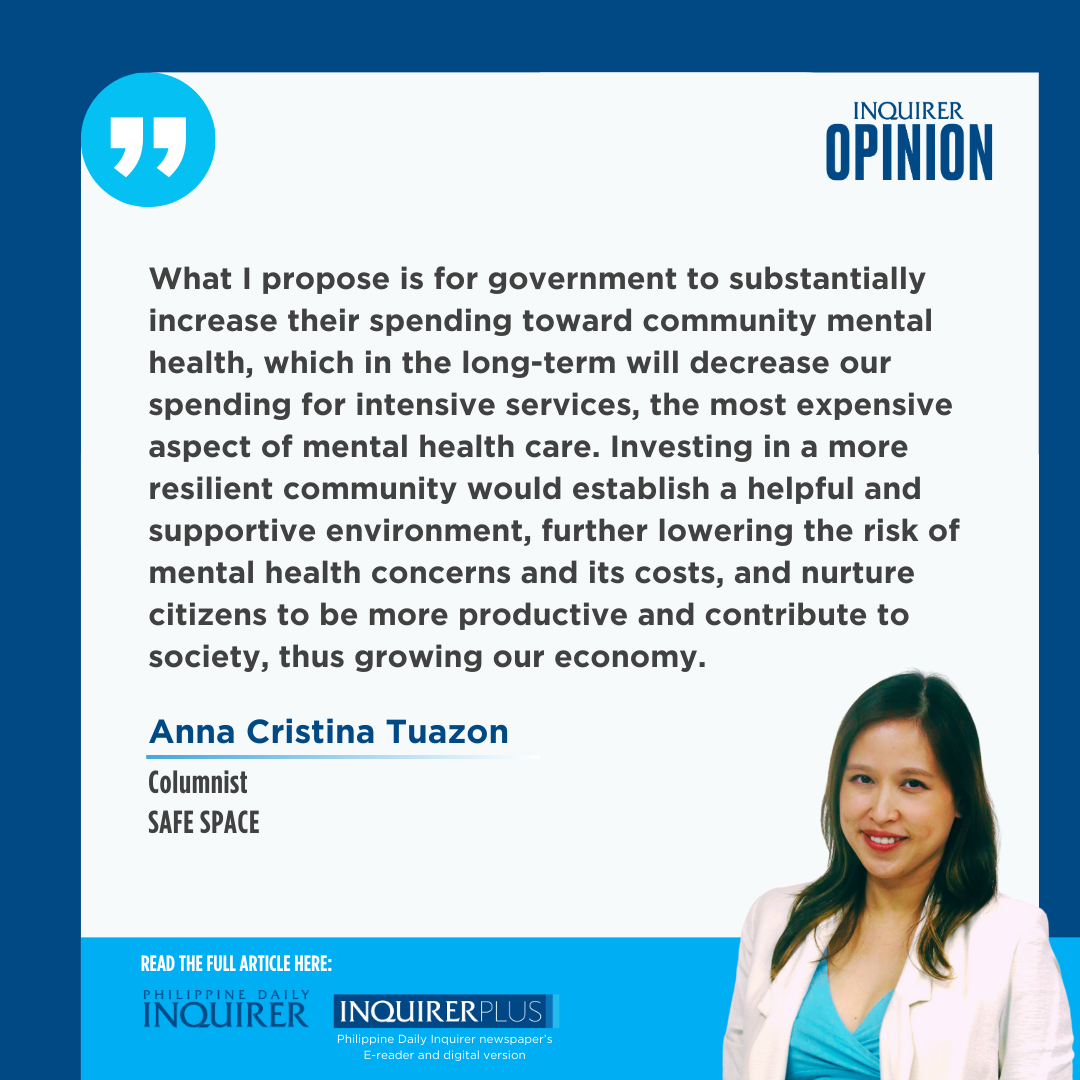Sustainable mental health care (4)
For the month of October, I had been laying out the challenges (and some ideas) toward a sustainable mental health care for Filipinos. In the first week, I described the current landscape of Philippine mental health care. We have long ignored and failed to attend to public mental health concerns. This culminated in millions of Filipinos experiencing mental health crisis, where preventive care is no longer enough. Instead, they require expensive and specialist-intensive emergency and intensive mental health care.
In the second week, I explored further the financial burden of mental health care. Due to a mostly privatized mental health-care system and severe underfunding of public services, the expenses are mostly shouldered by individuals. The nature of mental health concerns, which tend to be long-term and require multiple modes of intervention and support, exacerbates these costs, leading some people to forego getting care altogether. I advocated for more financial investment by government toward a comprehensive public mental health-care system to increase access of services to Filipinos regardless of their capacity to pay.
Article continues after this advertisementIn the third week, I talked about the manpower side of our mental health care crisis. We are far behind the ideal ratio of providers needed to fully cover all Filipinos. Despite multiple professions (psychiatry, psychology, guidance counselors, etc.) having the capacity to provide mental health services, they still have difficulty training enough people due to the advanced skills required to treat the wide range of mental health concerns. While current recommendations encourage lowering the training requirements in the hopes of increasing manpower, I expressed concern at the risk this poses to the safety and well-being of Filipino clients. I intimated the need to focus on training and certifying specific skills and competencies toward mental health and psychosocial support, as opposed to basing competency purely on disciplinal degrees.
Putting it all together, today I will attempt to propose a way in which we can build a truly sustainable mental health care for our country. How is government usually motivated toward such causes? Pragmatically, I generally need to convince them that investing in mental health is cost-effective. Nothing turns off government officials more than the issue of shelling out money. This is why they prefer depending on volunteers, nongovernment organizations, as well as mandating taxpayers, employers, and businesses to shoulder the financial costs of mental health care.
When government does spend, they spend it in places that are familiar: hospitals and medical facilities. When it comes to mental health, however, these only represent the most aggravated and acute of cases. It is like setting up a health-care system by only putting up emergency rooms. Comprehensive mental health must extend beyond hospital doors and clinics and toward communities if we want to prevent crisis altogether. It is no wonder that institutions are reticent to provide funding because they only see never-ending crisis and, therefore, never-ending drainage of funds.
Article continues after this advertisementWhat I propose is for government to substantially increase their spending toward community mental health, which in the long-term will decrease our spending for intensive services, the most expensive aspect of mental health care. Investing in a more resilient community would establish a helpful and supportive environment, further lowering the risk of mental health concerns and its costs, and nurture citizens to be more productive and contribute to society, thus growing our economy.
We must create government positions for mental health (MH) providers and place them in public health units. If we can position an MH worker in the community, they can (1) assess their needs, (2) identify community stressors, (3) work with other public agencies like social work and education to address these stressors, and (4) monitor the overall mental health of the community, not just per individual. If MH workers only provide direct services to constituents, this is not true public mental health and will not be sustainable. Therefore, both the number and the skills of MH workers in the country must increase, particularly in doing public mental health work. Creating plantilla, with a salary grade commensurate to the training and skills required of a public MH worker, will allow for more predictable personnel costs for government, as opposed to funding short-term projects that rely on volunteers or the private sector. Predictable cost—especially knowing how much community gains from this investment—is a good thing because it means its funding can be planned far ahead. Job security also allows for more long-term goals and programs, allowing us to be more ambitious. If we recognize that the mental health crisis cannot be solved in 12-month durations, we will realize that investing more helps us to save more.
—————-
















